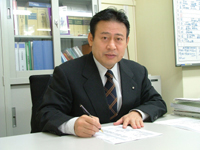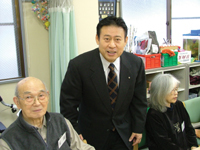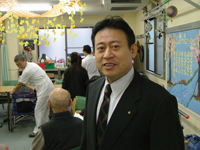Patient Profits
Back to Contents of Issue: February 2004
|
|
|
|
by Leo Lewis |
|
|
The innovative debt instrument (which exploits a previously unnoticed loophole) means that the citizens of the world's fastest-graying major economy will now be able to invest in the profitability of their own old age.
Meisei Medical's chief executive, Masaaki Kondo, is selling the experimental debt issue, worth around $2 million, to his company's patients -- the very people most likely to benefit from the hospital's improved future services.
The bond tempts all investors, but it is especially geared toward those who are over 65, urging them to consider the big money that can be made from the simple math of Japan's demographics: 39 percent of the population is over 50, but that same section of society owns 75 percent of all individually held assets.
Now other clinics and hospitals are planning to sell the bonds. Like Meisei, they will be feverishly pitching them to patients and medical staff. Surgery waiting rooms will become advertising centers for the products, and nurses will be trained to provide bedside financial information to interested investors.
The bond, which will carry a per annum interest of 2 percent and be sold in JPY1 million units, taps the recent Japanese retail investor craze for corporate debt. Despite its small yield, the Meisei bond still offers a return one percentage point higher than long-term interest rates at Japanese banks.
"I know this is going to be a success. Everyone who invests in this has grasped the fact they are going to get older and will need high quality healthcare," says Kondo, a former judo instructor who went into the medical business in the 80s. "The money from this bond will be used to upgrade an old building in the center of Tokyo and turn it into a top-class home for the aged."
Early appetite for the seven-year Meisei hospital bond is already strong, and other medical groups across the country are planning to launch their own issuances before the end of fiscal 2003. Twenty-three groups are already preparing to issue Meisei-type bonds by March 2004, and around half of the country's 1,900 private medical groups are considering their own projects. All are aware that there is a vast section of society ready to spend its savings on treatment at state-of-the-art medical facilities and residency in ultra-modern nursing homes. They need capital to set those places up, and that is why Meisei's newly discovered loophole has become such an attractive prospect.
The Meisei bond represents a surprise ray of hope for an industry raring to profit from the economics of aging. A Japanese law has been in place since the 19th century prohibiting medical organizations from becoming listed companies and from selling any sort of equity into the markets.
For more than 100 years, private medical operations have had to rely on the banks for their funding. But recently that avenue has been completely blocked. The non-performing loan crisis remains a major threat to the banks' future stability. Their survival strategies have centered on a near total clampdown on loans, particularly loans to the size of businesses represented by the private medical groups.
"The ability to raise real money is going to change the face of Japanese health care," Kondo says. "All of a sudden the hospitals can start considering merger and acquisition projects, efficiencies, economies of scale and a much more focused approach to the whole industry. My ambition is to control a nationwide chain of hospitals."
The JPY1,400 trillion of assets held by those over 50 is finally being dipped into, spawning a booming "silver" travel industry. But analysts believe that the most dependable investment in Japan's aged lies in the huge sums being lavished on healthcare and nursing facilities. The spending, say the experts, can only continue to grow, and the race is on to find which companies are best placed to reap the rewards.
At the top of many investors' lists is Niichi Gakkan, a health care services conglomerate that has now begun directing its management attention to the lucrative business of home nursing care. That side of the business is growing especially fast in line with the nationwide surge in working couples, and the inability or unwillingness of many married couples to look after their parents full-time.
A recent poll by the Japanese Cabinet Office revealed that even the elderly have given up hoping that their children will look after them. Between 2002 and 2003, the percentage of over-65s saying they wanted only their family to take care of them fell by half to 12.1 percent.
Niichi Gakkan was also quick to notice another yawning gap in the market. Japan's elderly want to know they are getting value for their hard-saved cash, and they are sticklers about proper certification for the caretakers looking after them. The company has added a major profit stream to its portfolio by establishing itself early as the dominant force in nursing care education. Sensing the vast employment opportunities created by the gray society, 110,000 workers sign up each year for Niichi Gak- kan's JPY90,000 four-month course -- and leave with all the proper licenses.
Other businesses that have spotted opportunities include the large electronics and machinery makers such as Matsushita and Omron, who have brought out healthcare-related products to tap into the home nursing market. 2003 sales of do-it-yourself blood pressure gauges, pulse-checking bathroom scales and home oxygen dispensers have far surpassed predictions.
On the grander scale, several companies are exploring the future market for upscale nursing homes that will remove Japan's elderly from the country altogether. Thailand beachfront property, with its cheap land prices and cheap labor, is currently favored as the top potential location. @ |
|
Note: The function "email this page" is currently not supported for this page.


 A cramped healthcare CLINIC for the aged in the suburban outskirts of Tokyo has made Japanese financial history by issuing the country's first ever "hospital bond."
A cramped healthcare CLINIC for the aged in the suburban outskirts of Tokyo has made Japanese financial history by issuing the country's first ever "hospital bond."
 He added that one of the prime reasons to be optimistic about the profitability of such ventures is a long-term social change in Japan. The aged are no longer as welcome as they once were in their children's homes, and rising employment levels among Japanese women mean there is rarely a free helper in the house.
He added that one of the prime reasons to be optimistic about the profitability of such ventures is a long-term social change in Japan. The aged are no longer as welcome as they once were in their children's homes, and rising employment levels among Japanese women mean there is rarely a free helper in the house.
 The Meisei bond is being placed by Kondo himself, though banking industry spokesmen have said that investment houses will almost certainly be brought on board to handle the deluge of issues now expected to follow in Meisei's wake. Hospitals have also been given a boost by the Association of Japanese Healthcare Corporations. The organization has drawn up a set of bond issuance standards to acquire the sort of creditworthy status that will attract institutional investment.
The Meisei bond is being placed by Kondo himself, though banking industry spokesmen have said that investment houses will almost certainly be brought on board to handle the deluge of issues now expected to follow in Meisei's wake. Hospitals have also been given a boost by the Association of Japanese Healthcare Corporations. The organization has drawn up a set of bond issuance standards to acquire the sort of creditworthy status that will attract institutional investment.




